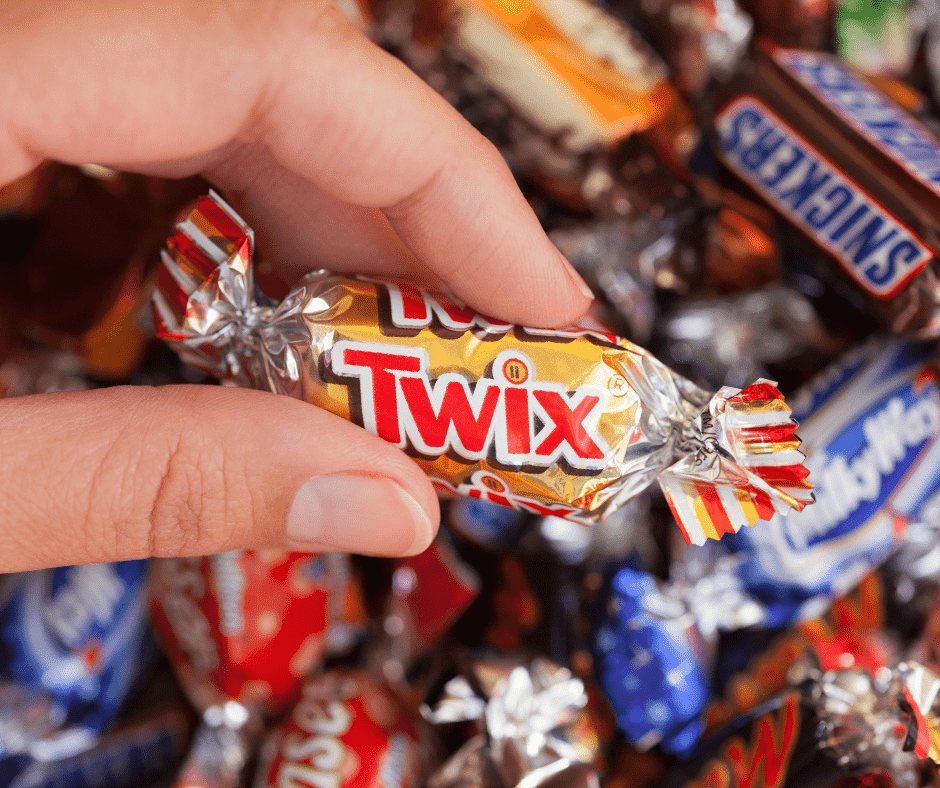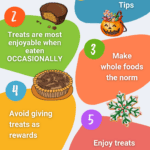Sweets n’ Treats: Can’t Stop Eating Desserts? Make Peace With Holiday Treats
Many of us have tried to curb our cravings for sweets n’ treats, whether by cutting them out of our diet, throwing them out of the house, or trying to limit the amount we have throughout the week. It’s maddening how difficult and almost impossible this can feel at times!
“My problem isn’t that I have a sweet tooth... it’s that I have several of them!”
It's no surprise that one of the most common complaints I hear from clients is about their struggle with SWEETS.
“If only I could stop eating that Halloween candy!" or, "If I could just eat less ice cream, I’d be healthier!” The struggle with craving sweets is real.
And as if our own issues with sweets weren’t enough… then there are the kids. Some days it seems like all they want is candy, candy, and more candy. I get it. My four kids are always talking about the next treat they can have, but guess what? That's totally normal!
Kids and adults are bombarded with sweets at school, at work, and of course through the media. And that's probably never going to change. What can change is:
- our mindset around why sweets seem to have power over us, and
- how we can moderate our sweet consumption in our homes.
Are sweet treats REALLY as bad as they claim to be?
No! To be honest, they are tasty for a reason.
Desserts were never meant to be something we eat all the time. It’s mind-boggling to realize that sugar was once only available a few months out of the year, when fruit was in season. Over the centuries, as sugar became more available, it was still saved for special occasions.

However, as accessibility has increased over the last few centuries and as our lives have gotten busier, it makes sense that sugar has become a staple in our diet.
Is sugar really to blame here?
There are millions of reports linking the increase of sugar to the increase of obesity, but we are starting to realize that sugar alone is not the problem. BBC.com shared findings for research on sugar's impact on our health which concluded,
“A diet of more than 150g of fructose per day reduces insulin sensitivity – and therefore increases the risk of developing health problems like high blood pressure and cholesterol levels. But the researchers also concluded that this occurs most often when high sugar intake is combined with excess calories, and that the effects on health are ‘more likely’ due to sugar intake increasing the chance of excess calories, not the impact of sugar alone.”
“Insulin sensitivity occurs most often when high sugar intake is combined with excess calories, and that the effects on health are ‘more likely’ due to sugar intake increasing the chance of excess calories, not the impact of sugar alone.”
Controversially, the same article points out that some athletes who have higher sugar consumption have lower risks of cardiovascular disease. That claim is probably due to the fact that “fructose intake can be metabolized during exercise to increase performance.”
So wait, “some sugar consumption can be good for some people??” Yes!
As a coach, I love to teach women that food isn’t inherently good or bad, even eating desserts. Food isn’t a moral issue, and we don’t have to feel guilty for liking food that tastes good.
I can see why it can be so confusing though
Food companies tempt us with commercials featuring delicious products, and easy accessibility makes us think that we can have more.
Then, on top of it, we have diet culture telling us that too much sugar is bad for us. They claim it makes us fat and causes us to have diseases that are impossible to overcome.
Is it possible to find moderation somewhere in the middle of those two ideas? To enjoy candy and desserts now and then instead of sweets ruling our lives?
It is! In my opinion, a donut isn't BAD for you, unless maybe you have an intolerance to ingredients in the donut! The tricky part comes when we want to eat too much dessert or too many donuts, right?
Eating a dozen donuts every day may not be the best option, nor overindulging in holiday candy because it won’t come around again for a year, as it will probably leave you feeling pretty yucky. But calling all donuts bad because of an individual struggle with self-restraint just doesn’t seem right.
It’s important to understand why we struggle with the overconsumption of sweets n' treats and that the solution isn’t blaming the donut.
Depriving and Restriction = Consumption and Shame
What if the solution has more to do with understanding what depriving yourself and restriction does to the brain?
Research is teaching us that depriving ourselves of eating desserts may increase cravings for sweets and treats. The same goes for our kids. If we are simply telling them, “We cannot have this because it is bad”, our brains will often feel deprived and eventually cave into those cravings.
In 2014, Appetite (a monthly peer-reviewed journal on normal and disordered eating) shared that depending on the child’s temperament and level of self-control, restrictions may not keep the child from wanting and eating restricted food.
I think the key to improving this problem is changing the way we view moderation in sweet consumption.
If you switch your mindset from perceiving certain things as "off limits and bad" to seeing them as something you enjoy occasionally because they have value, then you will feel less restricted and be able to make better decisions under a healthier mindset. This shift in perspective can help you overcome the feeling of restriction.

Do you ever hide in the pantry (or wherever your kids cannot find you) to enjoy holiday treats, Reeses or whatever you have in your secret stash so your kids won’t see you?
Part of the reason we hide may be so they’re not asking for more treats, but also with this mindset, we are telling ourselves that we’ve gotta eat this right now, while no one is watching.
Maybe, deep down, we don’t want our kids to see us eating said treats because we want to set a good example for them. But what are we actually doing when we sneak food behind their back?
First, we are telling ourselves that it’s okay to sneak and eat something that is "forbidden" which really isn’t great for our psyche, but we’re also showing our kids that they can sneak and hide to eat these delicious treats.
What if instead, you only eat sweet treats when with other people? In this scenario, you are practicing self-restraint and patience, all great qualities for you and your kids to learn.
Imagine the example we are leaving for others when we are able to say, “sweets are yummy, and sometimes even though we want to ONLY eat sweets, it’s better to make sure we get a good balance of food and every now and then still enjoy dessert.” It’s empowering when we can do it as adults and that feeling can rub off on our children.
So exciting, right?!
What Else Can I Do to Healthily Moderate Sweets at Home?
The above is just one idea on how to teach a balanced approach to moderation at home. What works for your family may be different!
Often it’s best to discuss and create rules to follow for your home.
I got these ideas from an article from Today’s Parents and although they're not meant to be hard and fast rules, I want to share my thoughts on why these might help.

Set treat guidelines
As the parent, we have the opportunity to set the example for healthy eating for our kids. Just like we’re not going to be perfect about it, neither will they, but these guidelines can be very helpful to know what is expected.
Make whole foods the norm
Often, if adults and children eat more whole foods, they’ll have fewer cravings for sweet treats or a lower desire to eat too much. Win-win, right?
Try to avoid treats as rewards
This tip aims to help create a healthy emotional eating mindset. It also creates a healthier relationship with food and gives a balanced approach to eating. If we give kids sweets to calm sad feelings, or as a reward for good behavior, it's possible to create triggers for cravings when they're feeling sad or have success.
Distract and interact
This goes along with the above. If, instead of rewarding with treats give them hugs and attention, we're better able to help our children recognize true hunger cues.
There’s always tomorrow
This is a great tip both for kids and us adults. At first there might be resistance because patience is hard! Knowing that we'll have treats again in the near future helps relieve the urgency and allows us to not feel deprived.
Which of the tips shared in this article would work best for your family?
You might need to give a few a try to find that sweet spot… pun intended.
Sweets n’ treats aren’t the enemy when it comes to developing a healthier relationship with food. You have the power to have them around and not overeat. Set an example for your kids so that they can learn healthier habits around how to moderate and enjoy sweets guilt-free on occasion.

Sweet and inspiring, Britt Nelson is a wellness coach and mom of 4, devoted to helping women redefine what wellness and fitness looks like to them, in a balanced and compassionate way.
When she is not coaching or chasing after her children, you can find her spending time with close friends and family, trying new recipes with one of her brothers, or listening to music, a good book, or a podcast.
Find other articles written by Coach Britt on her coach profile. She will help you ‘tune in’ to your body, and find a balance amidst the chaos.








